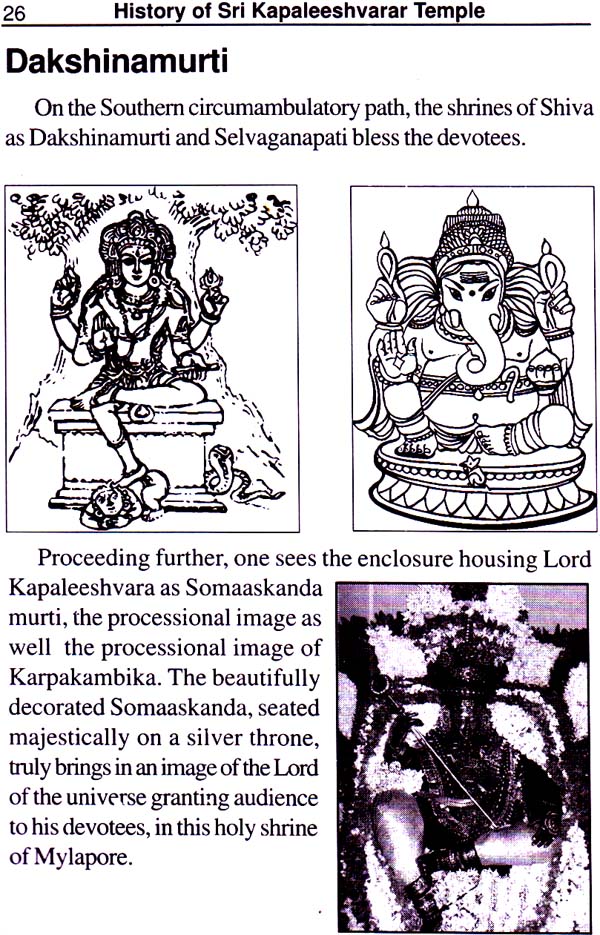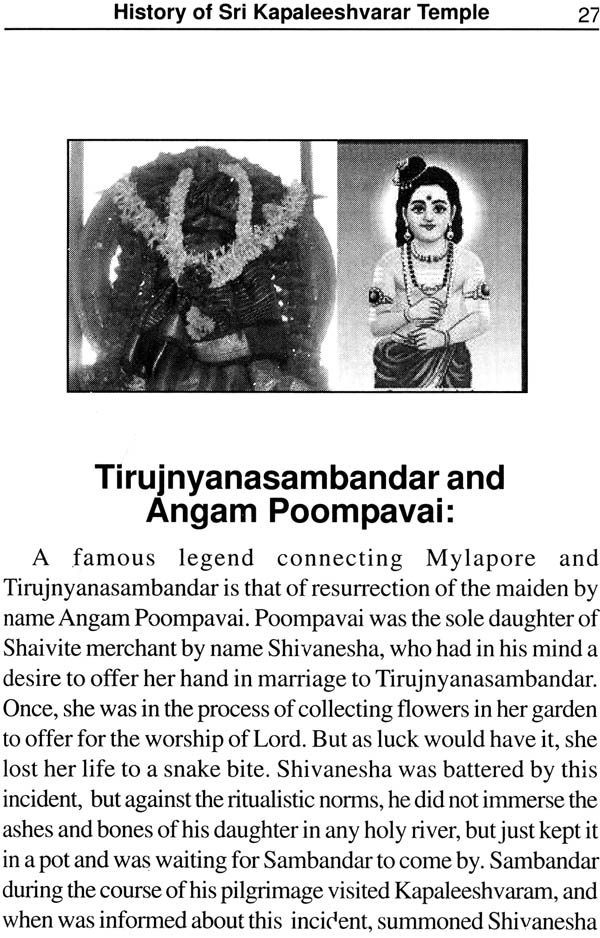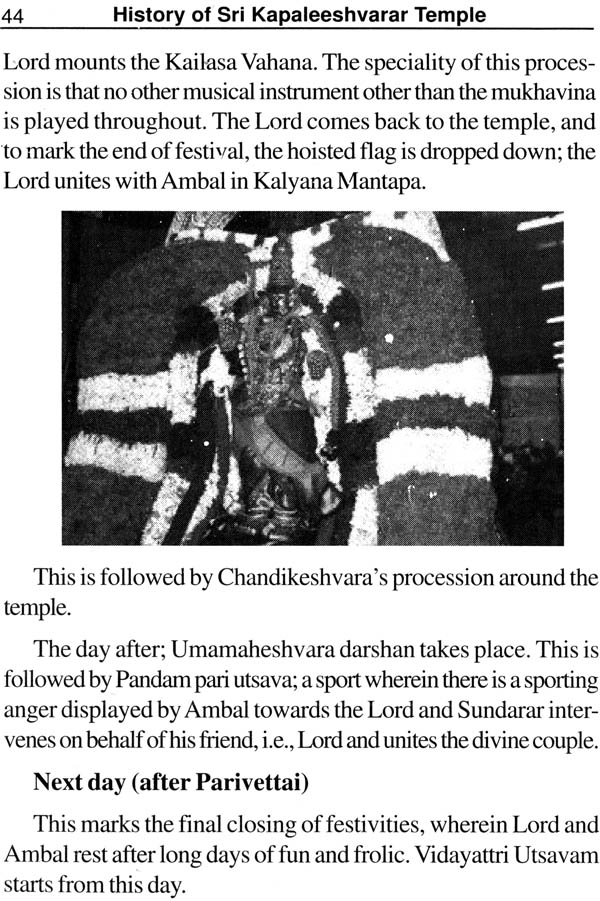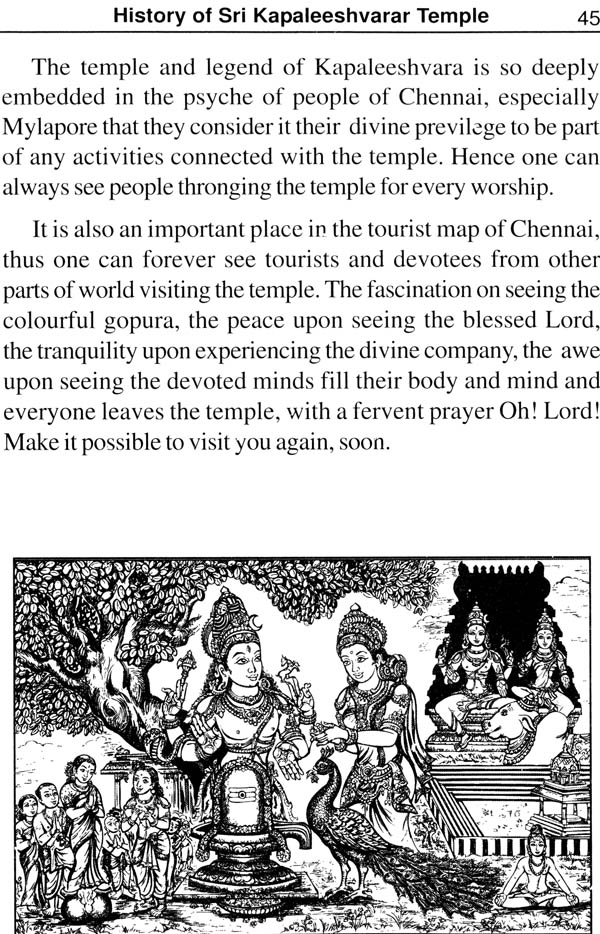
History or Sri Kapaleeshvarar Temple
Book Specification
| Item Code: | NAH373 |
| Publisher: | Giri Trading Agency Pvt Ltd, Chennai |
| Language: | English |
| Edition: | 2021 |
| ISBN: | 9788179506332 |
| Pages: | 48 (Throughout B/W Illustrations) |
| Cover: | Paperback |
| Other Details | 7.0 inch x 4.5 inch |
| Weight | 40 gm |
Book Description
Publisher Note
Chennai city is acknowledge to be the cultural capital of India by all. The culture thrives in the heart and soul of the city and it is sustained by the religious network which is woven through every citizen of Chennai. Anyone who wishes to experience the warmth of Indian culture would have to visit Mylapore which may termed as the hub of Indian culture more so south Indian.
The economy, culture and other activities of Mylapore is sustained by the famed Kapaleeshvara temple located here. The greatness of this shrine is sung by philosopher - saints such as Tirujnyanasambandar etc.,
Giri Trading Agency pioneer in publication of books on Indian culture is happy to present to the general public a small guide book on this world famous shrine. This booklet contains essential details connected with the temple, such as its topography, speciality of shrines, importance and sequence of festivals etc.,
We thank Dr.Kethu Ramachandrasekhar of helping us in bringing out this work in English.
We hope that this book would serve as a key guide for all who wish to know and worship rather than treat this sacred place as a hop on destination. We offer this book at the holy feet of Lord Kapaleeshvara and his divine con ort Karpakambika.
Publishers Note
The Vedas depict the most sacred heritage of the mankind” sanatana dharma”. They reflect the development and the growth of human thought since time immemorial.
The Vedas are regarded as divine in origin since they had been revealed by God Himself to devout tapasvis & rishis during their period of penance and meditation. Hence they have neither a beginning nor an end and are referred to as apaurusheya.
Krishnadvaipayana the son of sage Parashara categorized the contents of the Vedas into four distinctive divisions called Rig, Yajur, Sama & Atharva. Owing to this humungous effort of his methodically arranging the content of the Vedas he came to be known to the world as Sage Veda Vyasa.
These Vedic Texts were taught in Ancient days through Shruti(Hearing) and Smriti(Remembering) method, where after listening to the texts rendered by the Teacher the same were repeated by the Disciples till they got mastered.
This Shruti and Smriti system of learning has over centuries undergone a sea of change and presently students who earnestly wish to learn look for support from teachers and books in different languages.
Over the years, we at GIRI have experienced the growing demand for the shlokas and mantras printed in English, among the younger generation.
Hence our latest publication titled “SASVARA VEDA MANTRAS” consisting some of the most important vedic texts from the Krishna Yajurveda like Rudram, Chamakam, Purusha Sooktam, Shree Sooktam, Soorya Namaskaaram, Taitreeya Upanishad etc has these Mantras printed in English.
Although there are no syllables in other languages equivalent to match the right pronunciation of Sanskrit shlokas we have put in great effort by using the right English syllable for the Mantras to sound correct.
We are sure that our efforts shall largely help and benefit the readers and they shall be blessed with best of health, wealth and prosperity.
Our humble prayers to the Almighty for peace and prosperity to prevail everywhere.
Contents
| 1 | Taittireeyopanishat | 7 |
| 2 | Mahanarayanopanishat | 30 |
| 3 | Laghunyasaha | 78 |
| 4 | Shree Rudraprashnaha - Namakam | 85 |
| 5 | Chamakaprashnaha | 100 |
| 6 | Purushasuktam | 109 |
| 7 | Narayanasuktam | 113 |
| 8 | Vishnu Suktam | 115 |
| 9 | Shree Suktam | 117 |
| 10 | Durga Suktam | 123 |
| 11 | Shoo Suktam | 124 |
| 12 | Neela Suktam | 126 |
| 13 | Ratree Suktam | 127 |
| 14 | Devee Su ktam | 128 |
| 15 | Medha Suktam | 129 |
| 16 | Shagya Suktam | 131 |
| 17 | Arunaprashnaha | 132 |
| 18 | Navagraha Namaskara Mantraha | 182 |
| 19 | Shanti Panchakam | 187 |
| 20 | Mantrapushpam | 190 |









